Business Law: Examining UK Laws, Government Role & Legal Solutions
VerifiedAdded on 2024/06/05
|19
|5444
|434
Report
AI Summary
This report provides a detailed analysis of business law in the UK, focusing on the statement that "parliament is sovereign" and its implications. It discusses various sources of UK laws, including legislation, common law, equity, customs, and parliamentary conventions. The report explains the government's role in the law-making process through its executive, legislative, and judiciary branches, differentiating between statutory and common law. It also highlights the impact of laws such as health and safety regulations, equal opportunities regulations, and the General Data Protection Regulation (GDPR) on businesses, providing insights into how these laws affect business operations and ensure employee welfare and data protection. The document is contributed by a student and available on Desklib, a platform offering AI-based study tools and resources.
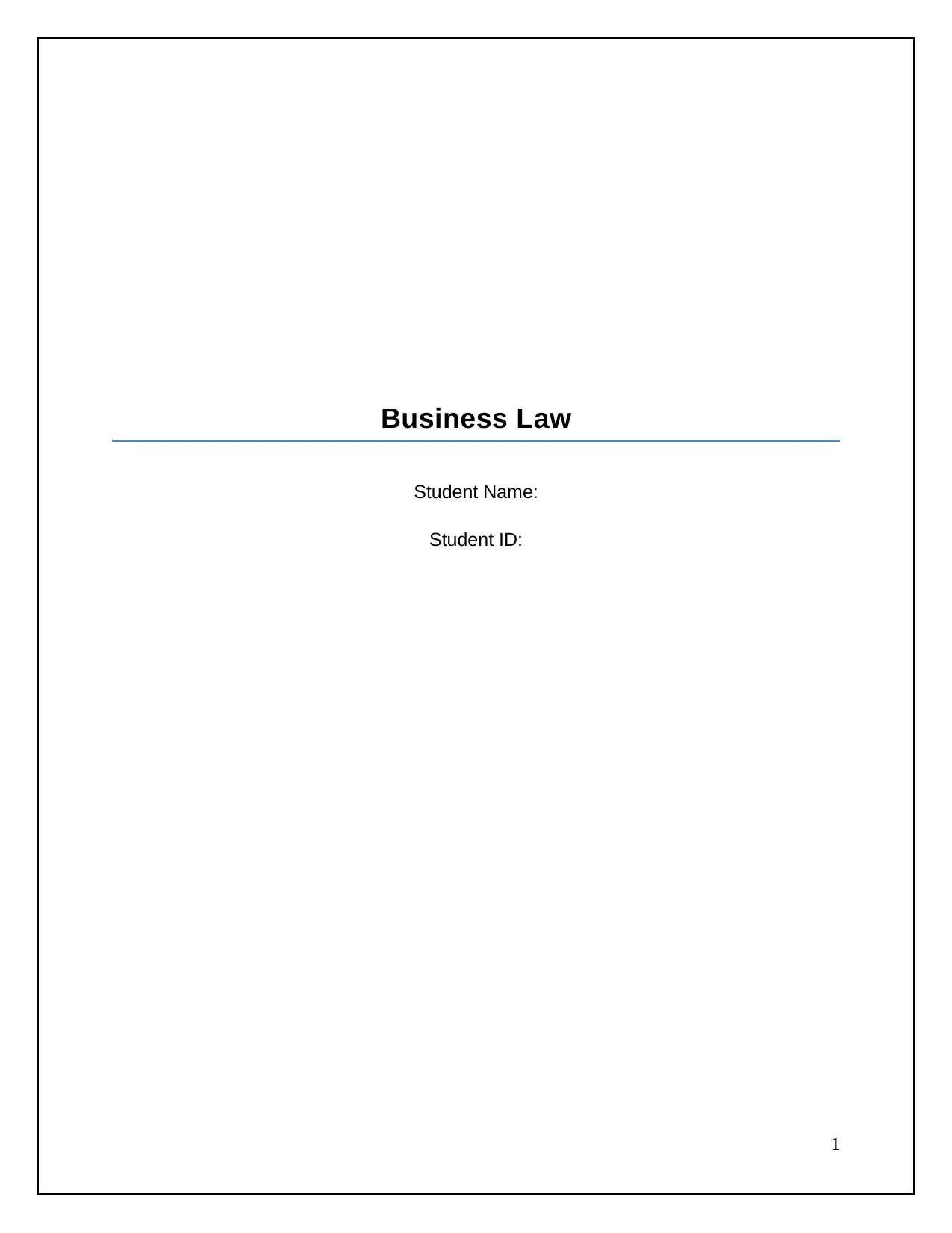
Business Law
Student Name:
Student ID:
1
Student Name:
Student ID:
1
Paraphrase This Document
Need a fresh take? Get an instant paraphrase of this document with our AI Paraphraser
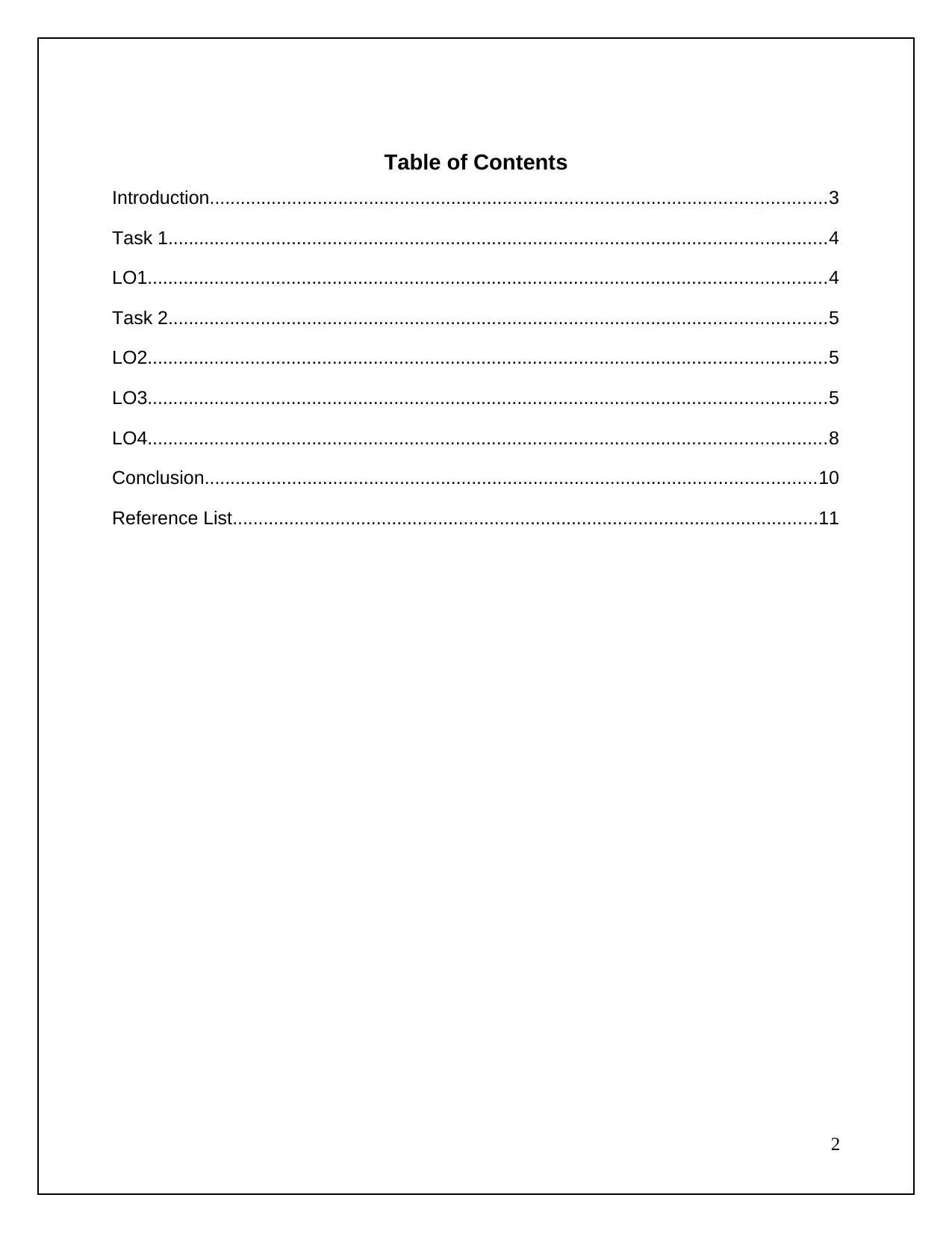
Table of Contents
Introduction........................................................................................................................3
Task 1................................................................................................................................4
LO1....................................................................................................................................4
Task 2................................................................................................................................5
LO2....................................................................................................................................5
LO3....................................................................................................................................5
LO4....................................................................................................................................8
Conclusion.......................................................................................................................10
Reference List..................................................................................................................11
2
Introduction........................................................................................................................3
Task 1................................................................................................................................4
LO1....................................................................................................................................4
Task 2................................................................................................................................5
LO2....................................................................................................................................5
LO3....................................................................................................................................5
LO4....................................................................................................................................8
Conclusion.......................................................................................................................10
Reference List..................................................................................................................11
2
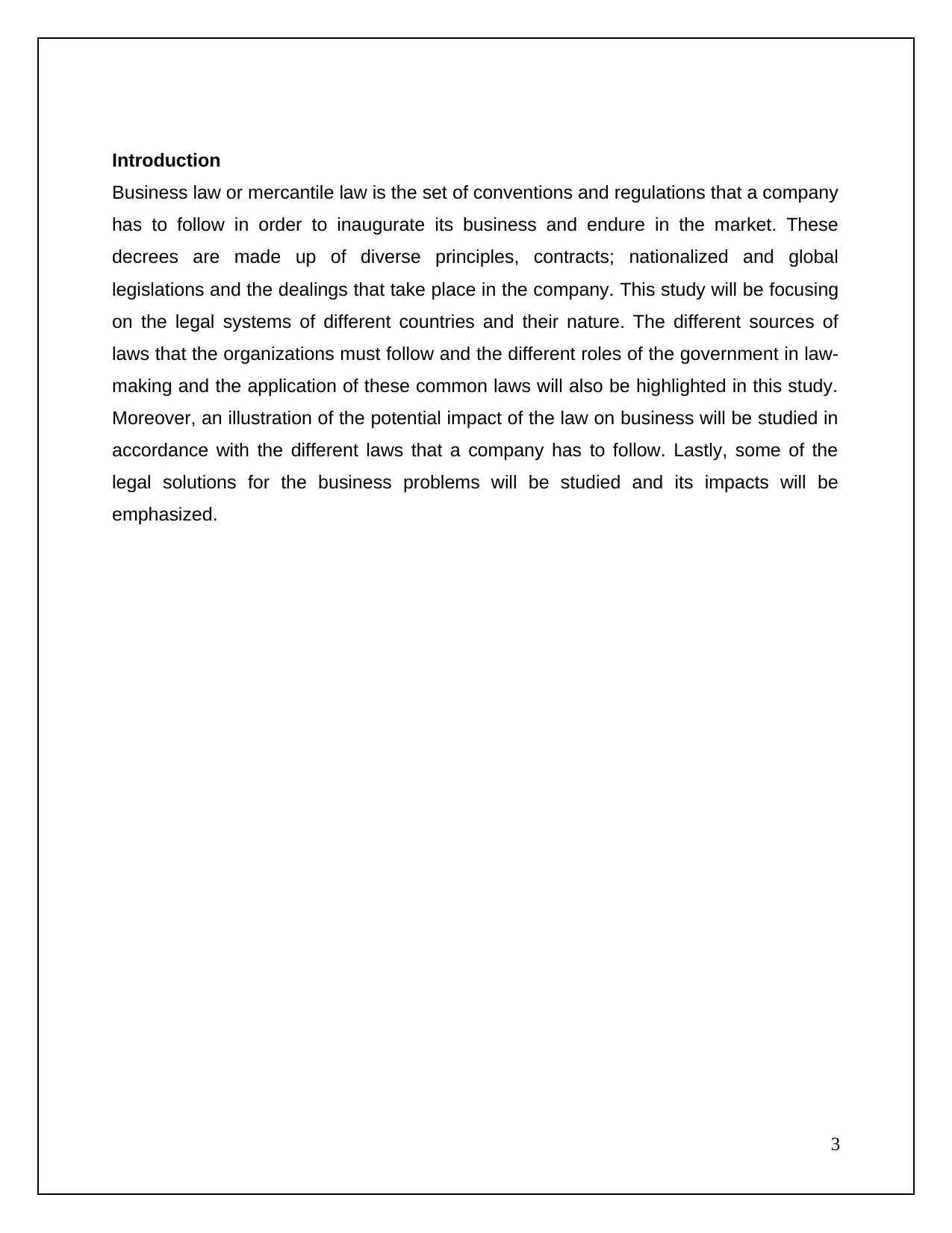
Introduction
Business law or mercantile law is the set of conventions and regulations that a company
has to follow in order to inaugurate its business and endure in the market. These
decrees are made up of diverse principles, contracts; nationalized and global
legislations and the dealings that take place in the company. This study will be focusing
on the legal systems of different countries and their nature. The different sources of
laws that the organizations must follow and the different roles of the government in law-
making and the application of these common laws will also be highlighted in this study.
Moreover, an illustration of the potential impact of the law on business will be studied in
accordance with the different laws that a company has to follow. Lastly, some of the
legal solutions for the business problems will be studied and its impacts will be
emphasized.
3
Business law or mercantile law is the set of conventions and regulations that a company
has to follow in order to inaugurate its business and endure in the market. These
decrees are made up of diverse principles, contracts; nationalized and global
legislations and the dealings that take place in the company. This study will be focusing
on the legal systems of different countries and their nature. The different sources of
laws that the organizations must follow and the different roles of the government in law-
making and the application of these common laws will also be highlighted in this study.
Moreover, an illustration of the potential impact of the law on business will be studied in
accordance with the different laws that a company has to follow. Lastly, some of the
legal solutions for the business problems will be studied and its impacts will be
emphasized.
3
⊘ This is a preview!⊘
Do you want full access?
Subscribe today to unlock all pages.

Trusted by 1+ million students worldwide
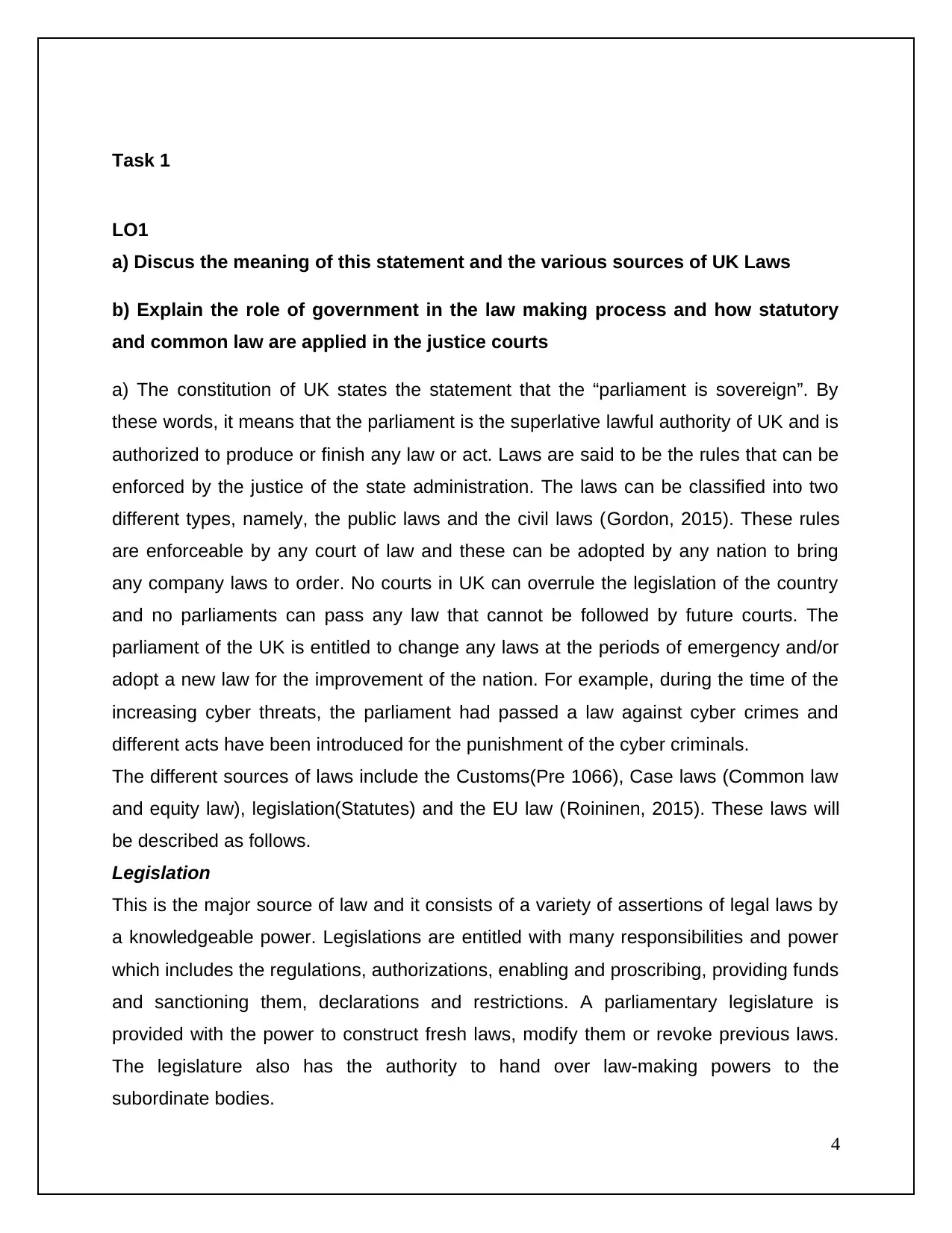
Task 1
LO1
a) Discus the meaning of this statement and the various sources of UK Laws
b) Explain the role of government in the law making process and how statutory
and common law are applied in the justice courts
a) The constitution of UK states the statement that the “parliament is sovereign”. By
these words, it means that the parliament is the superlative lawful authority of UK and is
authorized to produce or finish any law or act. Laws are said to be the rules that can be
enforced by the justice of the state administration. The laws can be classified into two
different types, namely, the public laws and the civil laws (Gordon, 2015). These rules
are enforceable by any court of law and these can be adopted by any nation to bring
any company laws to order. No courts in UK can overrule the legislation of the country
and no parliaments can pass any law that cannot be followed by future courts. The
parliament of the UK is entitled to change any laws at the periods of emergency and/or
adopt a new law for the improvement of the nation. For example, during the time of the
increasing cyber threats, the parliament had passed a law against cyber crimes and
different acts have been introduced for the punishment of the cyber criminals.
The different sources of laws include the Customs(Pre 1066), Case laws (Common law
and equity law), legislation(Statutes) and the EU law (Roininen, 2015). These laws will
be described as follows.
Legislation
This is the major source of law and it consists of a variety of assertions of legal laws by
a knowledgeable power. Legislations are entitled with many responsibilities and power
which includes the regulations, authorizations, enabling and proscribing, providing funds
and sanctioning them, declarations and restrictions. A parliamentary legislature is
provided with the power to construct fresh laws, modify them or revoke previous laws.
The legislature also has the authority to hand over law-making powers to the
subordinate bodies.
4
LO1
a) Discus the meaning of this statement and the various sources of UK Laws
b) Explain the role of government in the law making process and how statutory
and common law are applied in the justice courts
a) The constitution of UK states the statement that the “parliament is sovereign”. By
these words, it means that the parliament is the superlative lawful authority of UK and is
authorized to produce or finish any law or act. Laws are said to be the rules that can be
enforced by the justice of the state administration. The laws can be classified into two
different types, namely, the public laws and the civil laws (Gordon, 2015). These rules
are enforceable by any court of law and these can be adopted by any nation to bring
any company laws to order. No courts in UK can overrule the legislation of the country
and no parliaments can pass any law that cannot be followed by future courts. The
parliament of the UK is entitled to change any laws at the periods of emergency and/or
adopt a new law for the improvement of the nation. For example, during the time of the
increasing cyber threats, the parliament had passed a law against cyber crimes and
different acts have been introduced for the punishment of the cyber criminals.
The different sources of laws include the Customs(Pre 1066), Case laws (Common law
and equity law), legislation(Statutes) and the EU law (Roininen, 2015). These laws will
be described as follows.
Legislation
This is the major source of law and it consists of a variety of assertions of legal laws by
a knowledgeable power. Legislations are entitled with many responsibilities and power
which includes the regulations, authorizations, enabling and proscribing, providing funds
and sanctioning them, declarations and restrictions. A parliamentary legislature is
provided with the power to construct fresh laws, modify them or revoke previous laws.
The legislature also has the authority to hand over law-making powers to the
subordinate bodies.
4
Paraphrase This Document
Need a fresh take? Get an instant paraphrase of this document with our AI Paraphraser
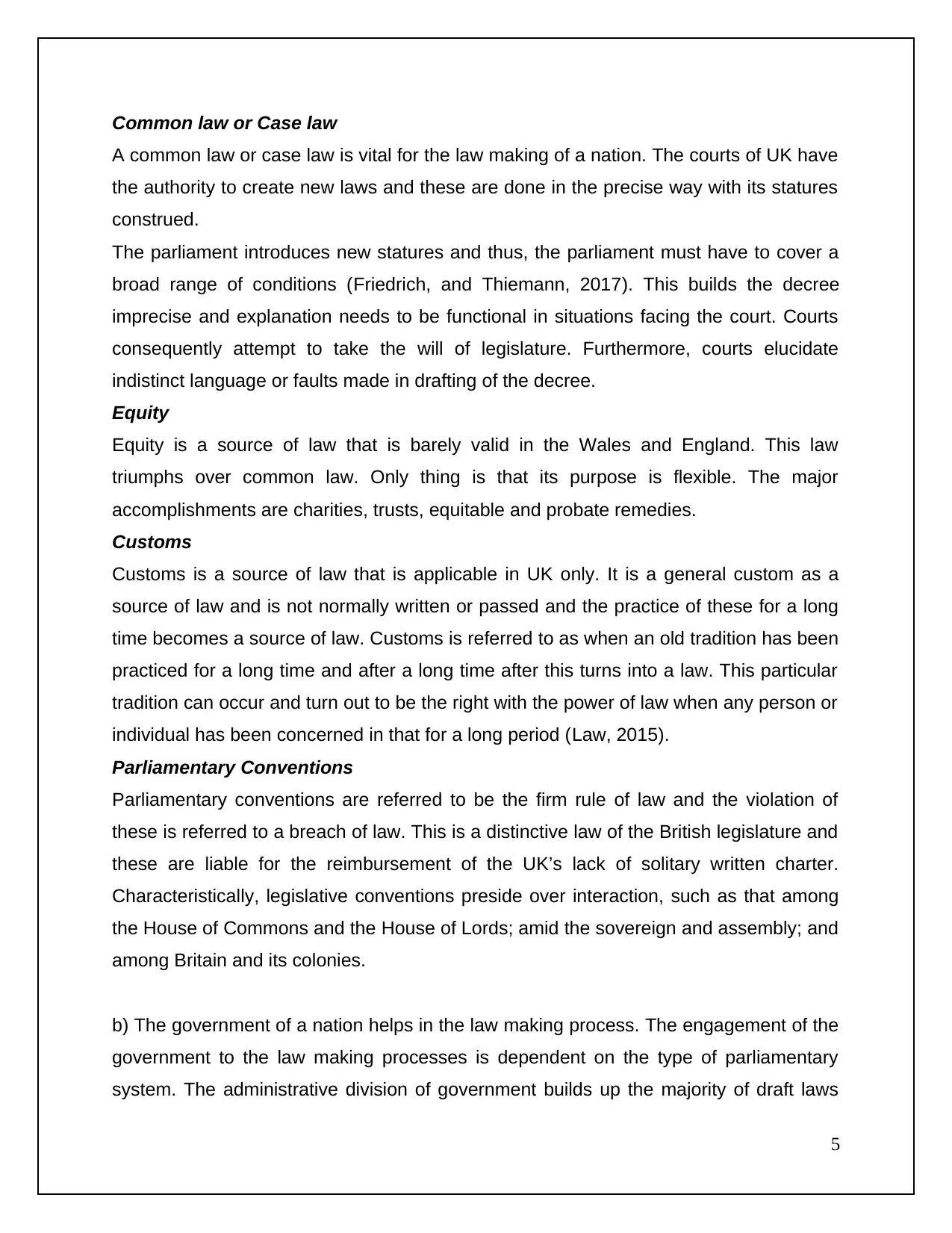
Common law or Case law
A common law or case law is vital for the law making of a nation. The courts of UK have
the authority to create new laws and these are done in the precise way with its statures
construed.
The parliament introduces new statures and thus, the parliament must have to cover a
broad range of conditions (Friedrich, and Thiemann, 2017). This builds the decree
imprecise and explanation needs to be functional in situations facing the court. Courts
consequently attempt to take the will of legislature. Furthermore, courts elucidate
indistinct language or faults made in drafting of the decree.
Equity
Equity is a source of law that is barely valid in the Wales and England. This law
triumphs over common law. Only thing is that its purpose is flexible. The major
accomplishments are charities, trusts, equitable and probate remedies.
Customs
Customs is a source of law that is applicable in UK only. It is a general custom as a
source of law and is not normally written or passed and the practice of these for a long
time becomes a source of law. Customs is referred to as when an old tradition has been
practiced for a long time and after a long time after this turns into a law. This particular
tradition can occur and turn out to be the right with the power of law when any person or
individual has been concerned in that for a long period (Law, 2015).
Parliamentary Conventions
Parliamentary conventions are referred to be the firm rule of law and the violation of
these is referred to a breach of law. This is a distinctive law of the British legislature and
these are liable for the reimbursement of the UK’s lack of solitary written charter.
Characteristically, legislative conventions preside over interaction, such as that among
the House of Commons and the House of Lords; amid the sovereign and assembly; and
among Britain and its colonies.
b) The government of a nation helps in the law making process. The engagement of the
government to the law making processes is dependent on the type of parliamentary
system. The administrative division of government builds up the majority of draft laws
5
A common law or case law is vital for the law making of a nation. The courts of UK have
the authority to create new laws and these are done in the precise way with its statures
construed.
The parliament introduces new statures and thus, the parliament must have to cover a
broad range of conditions (Friedrich, and Thiemann, 2017). This builds the decree
imprecise and explanation needs to be functional in situations facing the court. Courts
consequently attempt to take the will of legislature. Furthermore, courts elucidate
indistinct language or faults made in drafting of the decree.
Equity
Equity is a source of law that is barely valid in the Wales and England. This law
triumphs over common law. Only thing is that its purpose is flexible. The major
accomplishments are charities, trusts, equitable and probate remedies.
Customs
Customs is a source of law that is applicable in UK only. It is a general custom as a
source of law and is not normally written or passed and the practice of these for a long
time becomes a source of law. Customs is referred to as when an old tradition has been
practiced for a long time and after a long time after this turns into a law. This particular
tradition can occur and turn out to be the right with the power of law when any person or
individual has been concerned in that for a long period (Law, 2015).
Parliamentary Conventions
Parliamentary conventions are referred to be the firm rule of law and the violation of
these is referred to a breach of law. This is a distinctive law of the British legislature and
these are liable for the reimbursement of the UK’s lack of solitary written charter.
Characteristically, legislative conventions preside over interaction, such as that among
the House of Commons and the House of Lords; amid the sovereign and assembly; and
among Britain and its colonies.
b) The government of a nation helps in the law making process. The engagement of the
government to the law making processes is dependent on the type of parliamentary
system. The administrative division of government builds up the majority of draft laws
5
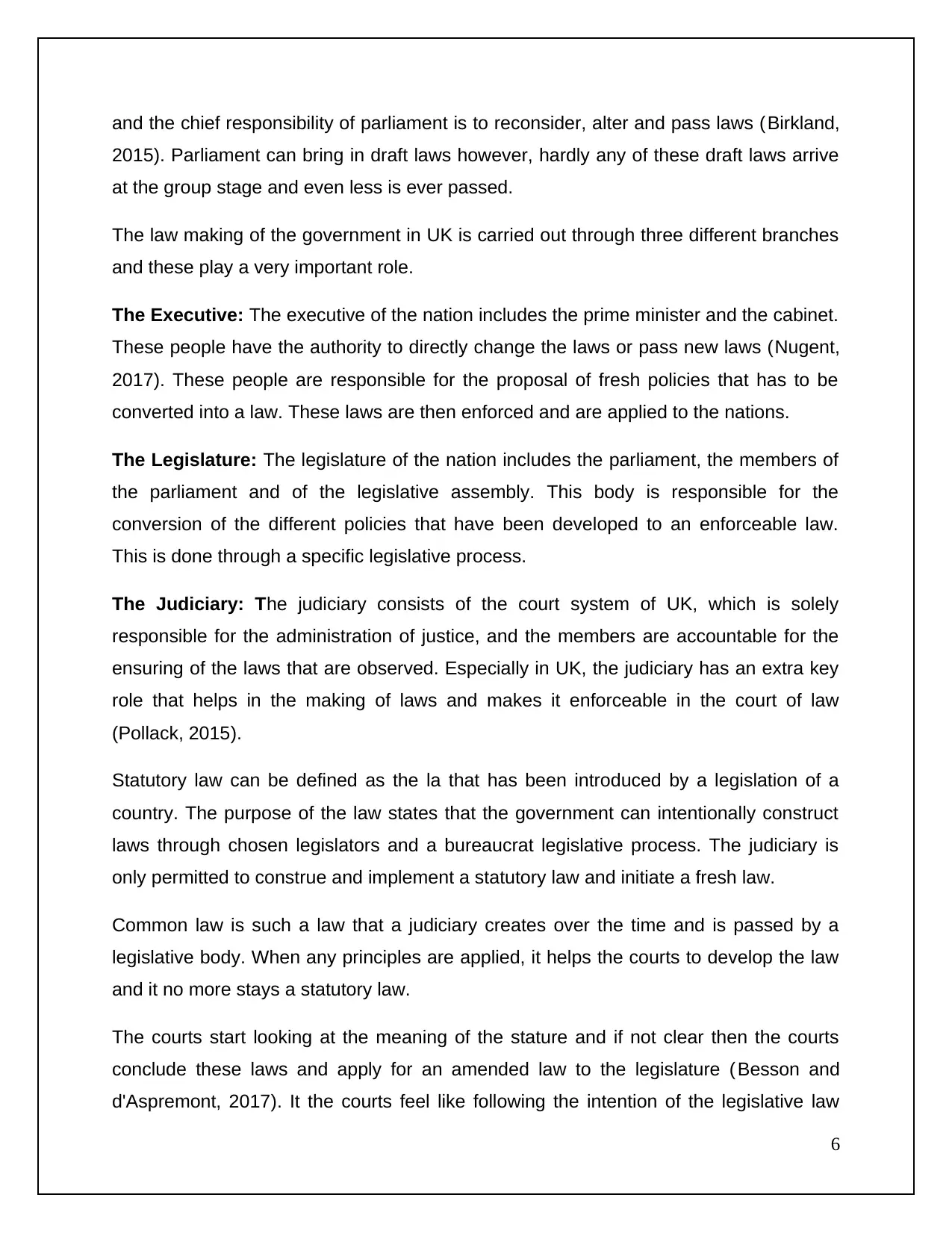
and the chief responsibility of parliament is to reconsider, alter and pass laws (Birkland,
2015). Parliament can bring in draft laws however, hardly any of these draft laws arrive
at the group stage and even less is ever passed.
The law making of the government in UK is carried out through three different branches
and these play a very important role.
The Executive: The executive of the nation includes the prime minister and the cabinet.
These people have the authority to directly change the laws or pass new laws (Nugent,
2017). These people are responsible for the proposal of fresh policies that has to be
converted into a law. These laws are then enforced and are applied to the nations.
The Legislature: The legislature of the nation includes the parliament, the members of
the parliament and of the legislative assembly. This body is responsible for the
conversion of the different policies that have been developed to an enforceable law.
This is done through a specific legislative process.
The Judiciary: The judiciary consists of the court system of UK, which is solely
responsible for the administration of justice, and the members are accountable for the
ensuring of the laws that are observed. Especially in UK, the judiciary has an extra key
role that helps in the making of laws and makes it enforceable in the court of law
(Pollack, 2015).
Statutory law can be defined as the la that has been introduced by a legislation of a
country. The purpose of the law states that the government can intentionally construct
laws through chosen legislators and a bureaucrat legislative process. The judiciary is
only permitted to construe and implement a statutory law and initiate a fresh law.
Common law is such a law that a judiciary creates over the time and is passed by a
legislative body. When any principles are applied, it helps the courts to develop the law
and it no more stays a statutory law.
The courts start looking at the meaning of the stature and if not clear then the courts
conclude these laws and apply for an amended law to the legislature ( Besson and
d'Aspremont, 2017). It the courts feel like following the intention of the legislative law
6
2015). Parliament can bring in draft laws however, hardly any of these draft laws arrive
at the group stage and even less is ever passed.
The law making of the government in UK is carried out through three different branches
and these play a very important role.
The Executive: The executive of the nation includes the prime minister and the cabinet.
These people have the authority to directly change the laws or pass new laws (Nugent,
2017). These people are responsible for the proposal of fresh policies that has to be
converted into a law. These laws are then enforced and are applied to the nations.
The Legislature: The legislature of the nation includes the parliament, the members of
the parliament and of the legislative assembly. This body is responsible for the
conversion of the different policies that have been developed to an enforceable law.
This is done through a specific legislative process.
The Judiciary: The judiciary consists of the court system of UK, which is solely
responsible for the administration of justice, and the members are accountable for the
ensuring of the laws that are observed. Especially in UK, the judiciary has an extra key
role that helps in the making of laws and makes it enforceable in the court of law
(Pollack, 2015).
Statutory law can be defined as the la that has been introduced by a legislation of a
country. The purpose of the law states that the government can intentionally construct
laws through chosen legislators and a bureaucrat legislative process. The judiciary is
only permitted to construe and implement a statutory law and initiate a fresh law.
Common law is such a law that a judiciary creates over the time and is passed by a
legislative body. When any principles are applied, it helps the courts to develop the law
and it no more stays a statutory law.
The courts start looking at the meaning of the stature and if not clear then the courts
conclude these laws and apply for an amended law to the legislature ( Besson and
d'Aspremont, 2017). It the courts feel like following the intention of the legislative law
6
⊘ This is a preview!⊘
Do you want full access?
Subscribe today to unlock all pages.

Trusted by 1+ million students worldwide
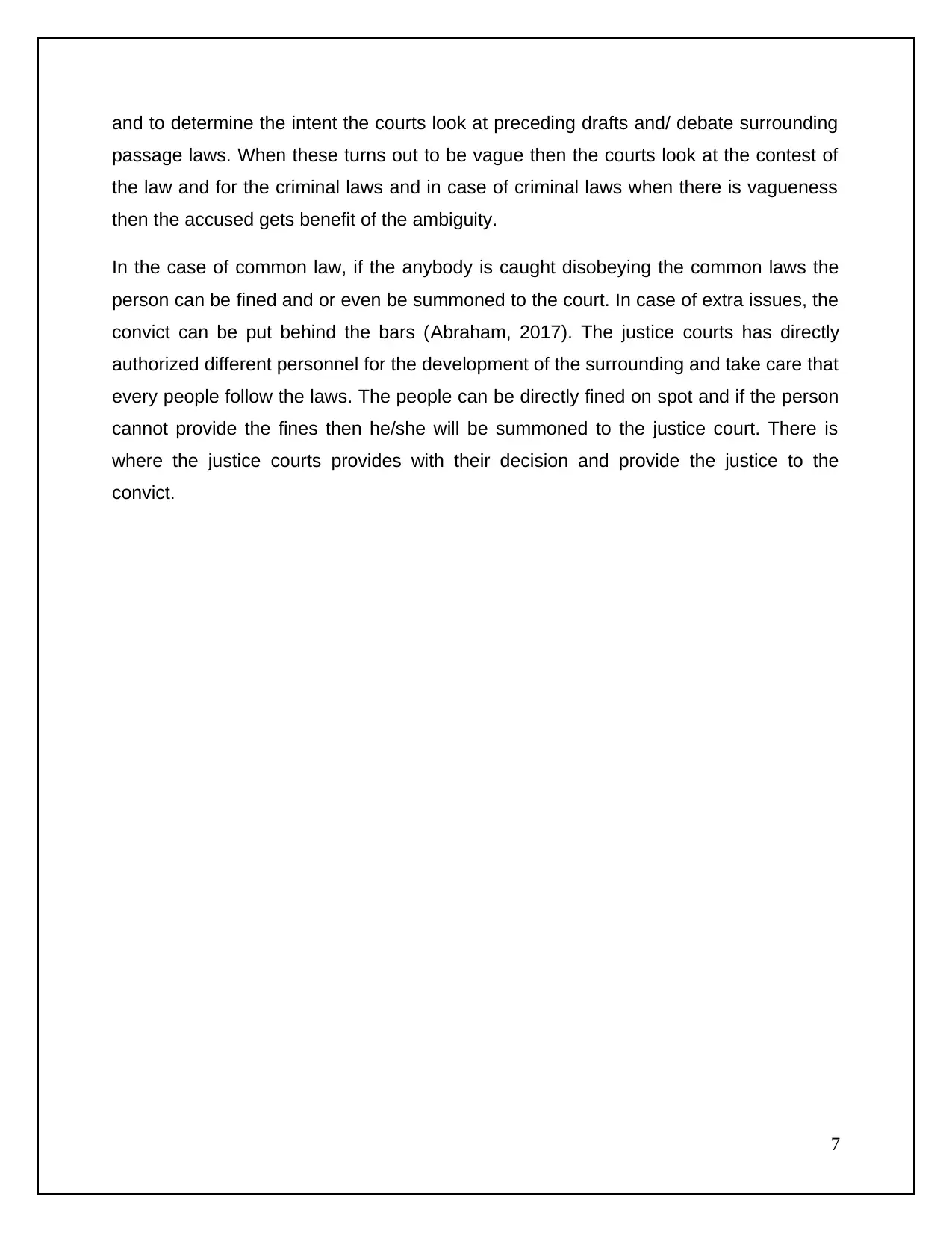
and to determine the intent the courts look at preceding drafts and/ debate surrounding
passage laws. When these turns out to be vague then the courts look at the contest of
the law and for the criminal laws and in case of criminal laws when there is vagueness
then the accused gets benefit of the ambiguity.
In the case of common law, if the anybody is caught disobeying the common laws the
person can be fined and or even be summoned to the court. In case of extra issues, the
convict can be put behind the bars (Abraham, 2017). The justice courts has directly
authorized different personnel for the development of the surrounding and take care that
every people follow the laws. The people can be directly fined on spot and if the person
cannot provide the fines then he/she will be summoned to the justice court. There is
where the justice courts provides with their decision and provide the justice to the
convict.
7
passage laws. When these turns out to be vague then the courts look at the contest of
the law and for the criminal laws and in case of criminal laws when there is vagueness
then the accused gets benefit of the ambiguity.
In the case of common law, if the anybody is caught disobeying the common laws the
person can be fined and or even be summoned to the court. In case of extra issues, the
convict can be put behind the bars (Abraham, 2017). The justice courts has directly
authorized different personnel for the development of the surrounding and take care that
every people follow the laws. The people can be directly fined on spot and if the person
cannot provide the fines then he/she will be summoned to the justice court. There is
where the justice courts provides with their decision and provide the justice to the
convict.
7
Paraphrase This Document
Need a fresh take? Get an instant paraphrase of this document with our AI Paraphraser
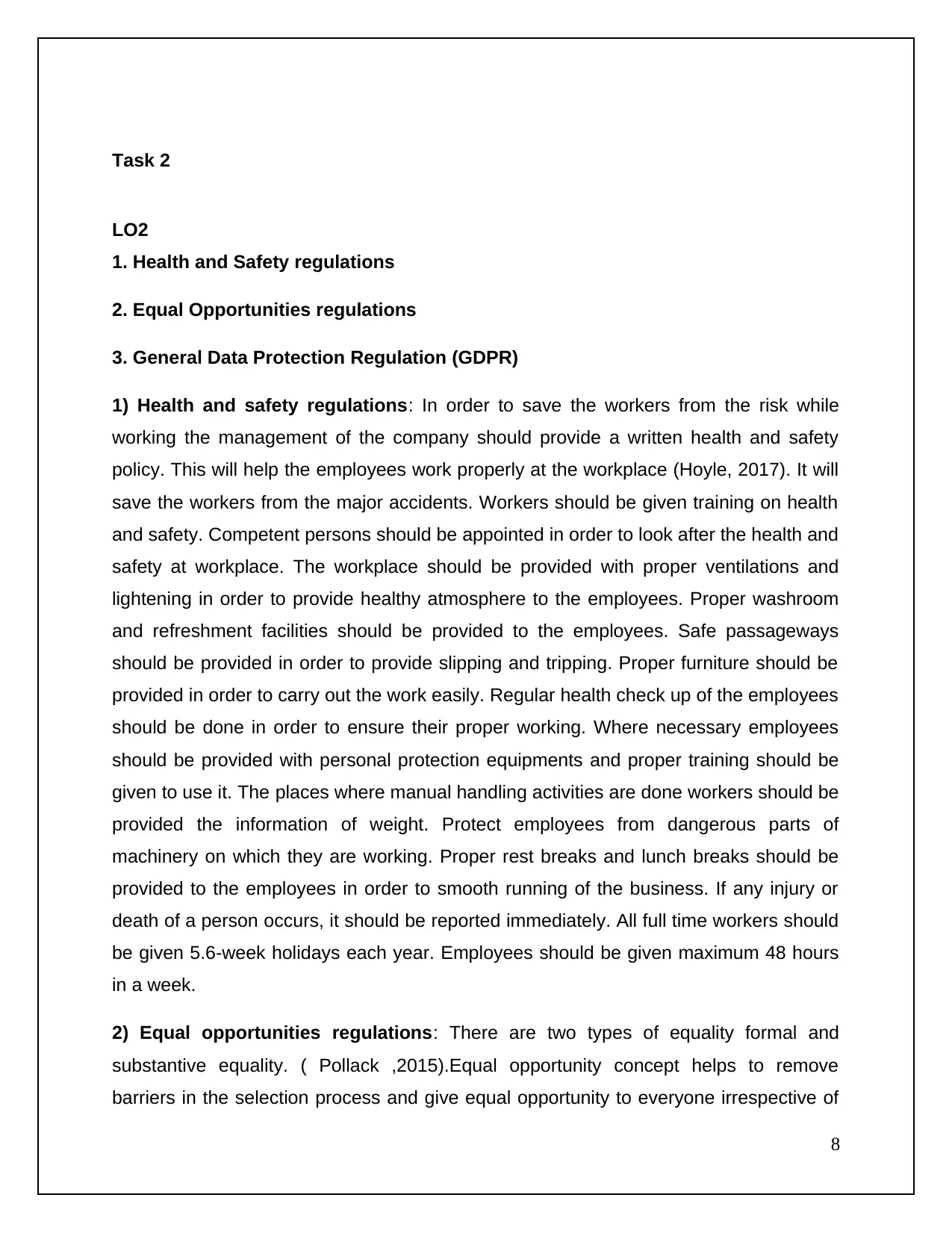
Task 2
LO2
1. Health and Safety regulations
2. Equal Opportunities regulations
3. General Data Protection Regulation (GDPR)
1) Health and safety regulations: In order to save the workers from the risk while
working the management of the company should provide a written health and safety
policy. This will help the employees work properly at the workplace (Hoyle, 2017). It will
save the workers from the major accidents. Workers should be given training on health
and safety. Competent persons should be appointed in order to look after the health and
safety at workplace. The workplace should be provided with proper ventilations and
lightening in order to provide healthy atmosphere to the employees. Proper washroom
and refreshment facilities should be provided to the employees. Safe passageways
should be provided in order to provide slipping and tripping. Proper furniture should be
provided in order to carry out the work easily. Regular health check up of the employees
should be done in order to ensure their proper working. Where necessary employees
should be provided with personal protection equipments and proper training should be
given to use it. The places where manual handling activities are done workers should be
provided the information of weight. Protect employees from dangerous parts of
machinery on which they are working. Proper rest breaks and lunch breaks should be
provided to the employees in order to smooth running of the business. If any injury or
death of a person occurs, it should be reported immediately. All full time workers should
be given 5.6-week holidays each year. Employees should be given maximum 48 hours
in a week.
2) Equal opportunities regulations: There are two types of equality formal and
substantive equality. ( Pollack ,2015).Equal opportunity concept helps to remove
barriers in the selection process and give equal opportunity to everyone irrespective of
8
LO2
1. Health and Safety regulations
2. Equal Opportunities regulations
3. General Data Protection Regulation (GDPR)
1) Health and safety regulations: In order to save the workers from the risk while
working the management of the company should provide a written health and safety
policy. This will help the employees work properly at the workplace (Hoyle, 2017). It will
save the workers from the major accidents. Workers should be given training on health
and safety. Competent persons should be appointed in order to look after the health and
safety at workplace. The workplace should be provided with proper ventilations and
lightening in order to provide healthy atmosphere to the employees. Proper washroom
and refreshment facilities should be provided to the employees. Safe passageways
should be provided in order to provide slipping and tripping. Proper furniture should be
provided in order to carry out the work easily. Regular health check up of the employees
should be done in order to ensure their proper working. Where necessary employees
should be provided with personal protection equipments and proper training should be
given to use it. The places where manual handling activities are done workers should be
provided the information of weight. Protect employees from dangerous parts of
machinery on which they are working. Proper rest breaks and lunch breaks should be
provided to the employees in order to smooth running of the business. If any injury or
death of a person occurs, it should be reported immediately. All full time workers should
be given 5.6-week holidays each year. Employees should be given maximum 48 hours
in a week.
2) Equal opportunities regulations: There are two types of equality formal and
substantive equality. ( Pollack ,2015).Equal opportunity concept helps to remove
barriers in the selection process and give equal opportunity to everyone irrespective of
8
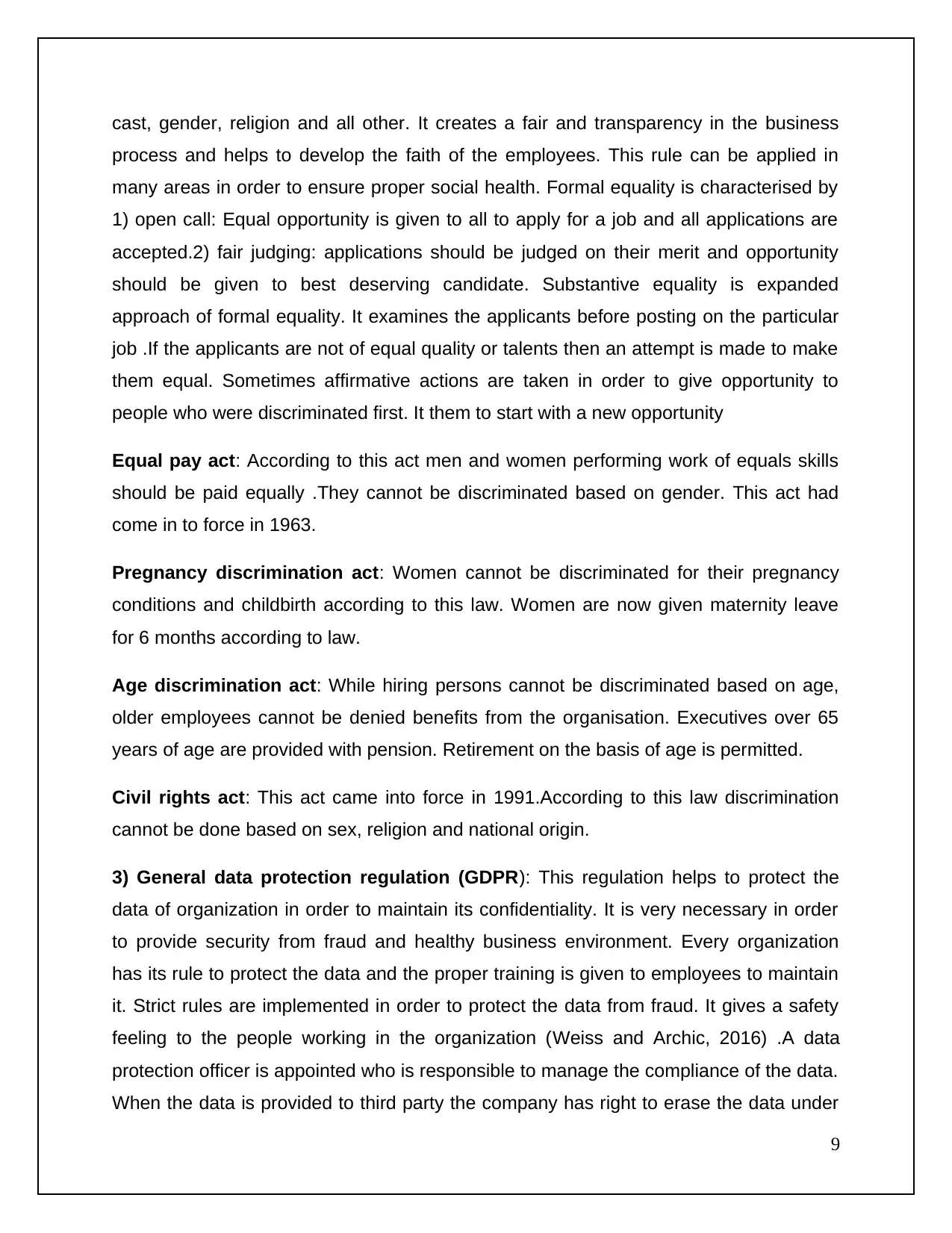
cast, gender, religion and all other. It creates a fair and transparency in the business
process and helps to develop the faith of the employees. This rule can be applied in
many areas in order to ensure proper social health. Formal equality is characterised by
1) open call: Equal opportunity is given to all to apply for a job and all applications are
accepted.2) fair judging: applications should be judged on their merit and opportunity
should be given to best deserving candidate. Substantive equality is expanded
approach of formal equality. It examines the applicants before posting on the particular
job .If the applicants are not of equal quality or talents then an attempt is made to make
them equal. Sometimes affirmative actions are taken in order to give opportunity to
people who were discriminated first. It them to start with a new opportunity
Equal pay act: According to this act men and women performing work of equals skills
should be paid equally .They cannot be discriminated based on gender. This act had
come in to force in 1963.
Pregnancy discrimination act: Women cannot be discriminated for their pregnancy
conditions and childbirth according to this law. Women are now given maternity leave
for 6 months according to law.
Age discrimination act: While hiring persons cannot be discriminated based on age,
older employees cannot be denied benefits from the organisation. Executives over 65
years of age are provided with pension. Retirement on the basis of age is permitted.
Civil rights act: This act came into force in 1991.According to this law discrimination
cannot be done based on sex, religion and national origin.
3) General data protection regulation (GDPR): This regulation helps to protect the
data of organization in order to maintain its confidentiality. It is very necessary in order
to provide security from fraud and healthy business environment. Every organization
has its rule to protect the data and the proper training is given to employees to maintain
it. Strict rules are implemented in order to protect the data from fraud. It gives a safety
feeling to the people working in the organization (Weiss and Archic, 2016) .A data
protection officer is appointed who is responsible to manage the compliance of the data.
When the data is provided to third party the company has right to erase the data under
9
process and helps to develop the faith of the employees. This rule can be applied in
many areas in order to ensure proper social health. Formal equality is characterised by
1) open call: Equal opportunity is given to all to apply for a job and all applications are
accepted.2) fair judging: applications should be judged on their merit and opportunity
should be given to best deserving candidate. Substantive equality is expanded
approach of formal equality. It examines the applicants before posting on the particular
job .If the applicants are not of equal quality or talents then an attempt is made to make
them equal. Sometimes affirmative actions are taken in order to give opportunity to
people who were discriminated first. It them to start with a new opportunity
Equal pay act: According to this act men and women performing work of equals skills
should be paid equally .They cannot be discriminated based on gender. This act had
come in to force in 1963.
Pregnancy discrimination act: Women cannot be discriminated for their pregnancy
conditions and childbirth according to this law. Women are now given maternity leave
for 6 months according to law.
Age discrimination act: While hiring persons cannot be discriminated based on age,
older employees cannot be denied benefits from the organisation. Executives over 65
years of age are provided with pension. Retirement on the basis of age is permitted.
Civil rights act: This act came into force in 1991.According to this law discrimination
cannot be done based on sex, religion and national origin.
3) General data protection regulation (GDPR): This regulation helps to protect the
data of organization in order to maintain its confidentiality. It is very necessary in order
to provide security from fraud and healthy business environment. Every organization
has its rule to protect the data and the proper training is given to employees to maintain
it. Strict rules are implemented in order to protect the data from fraud. It gives a safety
feeling to the people working in the organization (Weiss and Archic, 2016) .A data
protection officer is appointed who is responsible to manage the compliance of the data.
When the data is provided to third party the company has right to erase the data under
9
⊘ This is a preview!⊘
Do you want full access?
Subscribe today to unlock all pages.

Trusted by 1+ million students worldwide
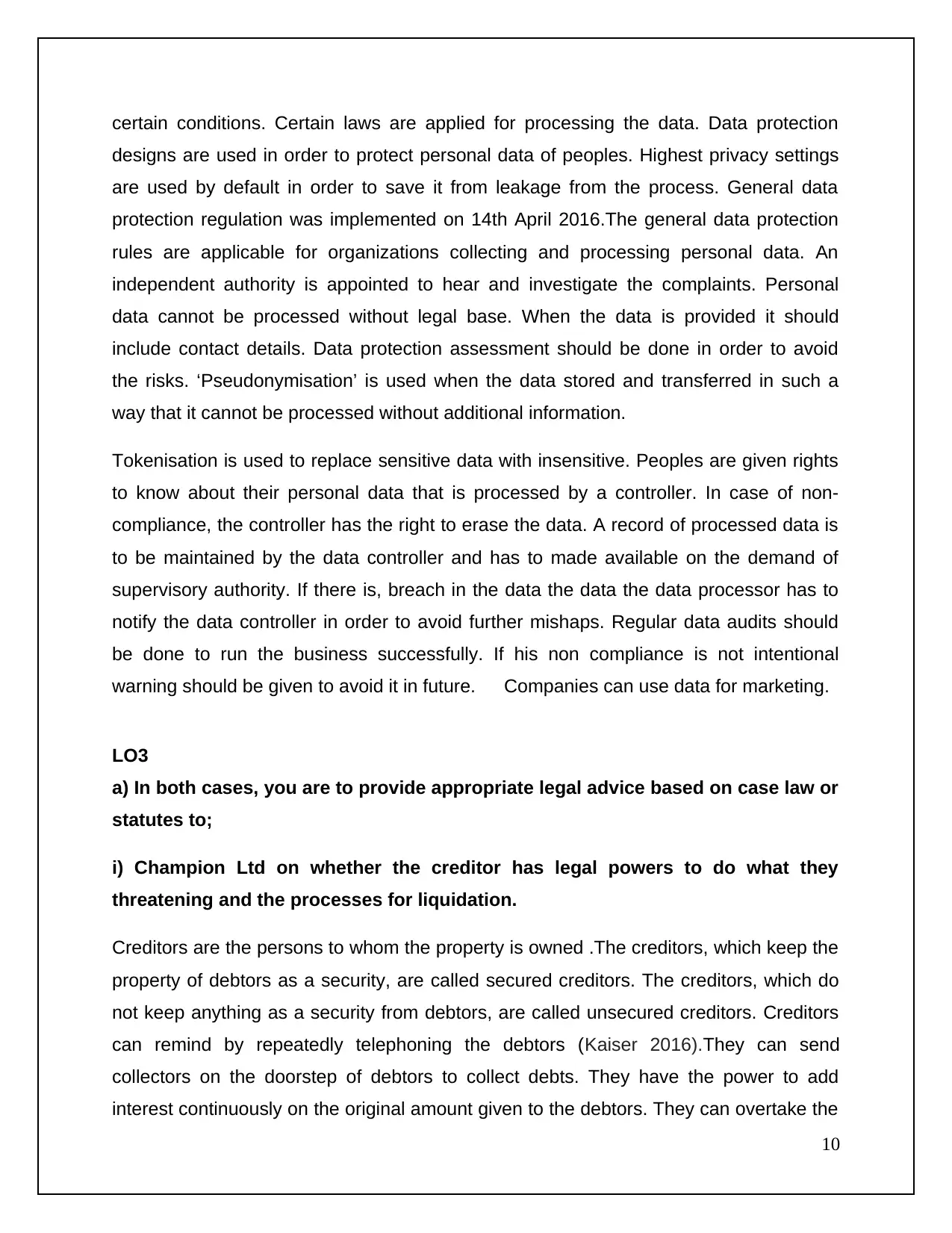
certain conditions. Certain laws are applied for processing the data. Data protection
designs are used in order to protect personal data of peoples. Highest privacy settings
are used by default in order to save it from leakage from the process. General data
protection regulation was implemented on 14th April 2016.The general data protection
rules are applicable for organizations collecting and processing personal data. An
independent authority is appointed to hear and investigate the complaints. Personal
data cannot be processed without legal base. When the data is provided it should
include contact details. Data protection assessment should be done in order to avoid
the risks. ‘Pseudonymisation’ is used when the data stored and transferred in such a
way that it cannot be processed without additional information.
Tokenisation is used to replace sensitive data with insensitive. Peoples are given rights
to know about their personal data that is processed by a controller. In case of non-
compliance, the controller has the right to erase the data. A record of processed data is
to be maintained by the data controller and has to made available on the demand of
supervisory authority. If there is, breach in the data the data the data processor has to
notify the data controller in order to avoid further mishaps. Regular data audits should
be done to run the business successfully. If his non compliance is not intentional
warning should be given to avoid it in future. Companies can use data for marketing.
LO3
a) In both cases, you are to provide appropriate legal advice based on case law or
statutes to;
i) Champion Ltd on whether the creditor has legal powers to do what they
threatening and the processes for liquidation.
Creditors are the persons to whom the property is owned .The creditors, which keep the
property of debtors as a security, are called secured creditors. The creditors, which do
not keep anything as a security from debtors, are called unsecured creditors. Creditors
can remind by repeatedly telephoning the debtors (Kaiser 2016).They can send
collectors on the doorstep of debtors to collect debts. They have the power to add
interest continuously on the original amount given to the debtors. They can overtake the
10
designs are used in order to protect personal data of peoples. Highest privacy settings
are used by default in order to save it from leakage from the process. General data
protection regulation was implemented on 14th April 2016.The general data protection
rules are applicable for organizations collecting and processing personal data. An
independent authority is appointed to hear and investigate the complaints. Personal
data cannot be processed without legal base. When the data is provided it should
include contact details. Data protection assessment should be done in order to avoid
the risks. ‘Pseudonymisation’ is used when the data stored and transferred in such a
way that it cannot be processed without additional information.
Tokenisation is used to replace sensitive data with insensitive. Peoples are given rights
to know about their personal data that is processed by a controller. In case of non-
compliance, the controller has the right to erase the data. A record of processed data is
to be maintained by the data controller and has to made available on the demand of
supervisory authority. If there is, breach in the data the data the data processor has to
notify the data controller in order to avoid further mishaps. Regular data audits should
be done to run the business successfully. If his non compliance is not intentional
warning should be given to avoid it in future. Companies can use data for marketing.
LO3
a) In both cases, you are to provide appropriate legal advice based on case law or
statutes to;
i) Champion Ltd on whether the creditor has legal powers to do what they
threatening and the processes for liquidation.
Creditors are the persons to whom the property is owned .The creditors, which keep the
property of debtors as a security, are called secured creditors. The creditors, which do
not keep anything as a security from debtors, are called unsecured creditors. Creditors
can remind by repeatedly telephoning the debtors (Kaiser 2016).They can send
collectors on the doorstep of debtors to collect debts. They have the power to add
interest continuously on the original amount given to the debtors. They can overtake the
10
Paraphrase This Document
Need a fresh take? Get an instant paraphrase of this document with our AI Paraphraser
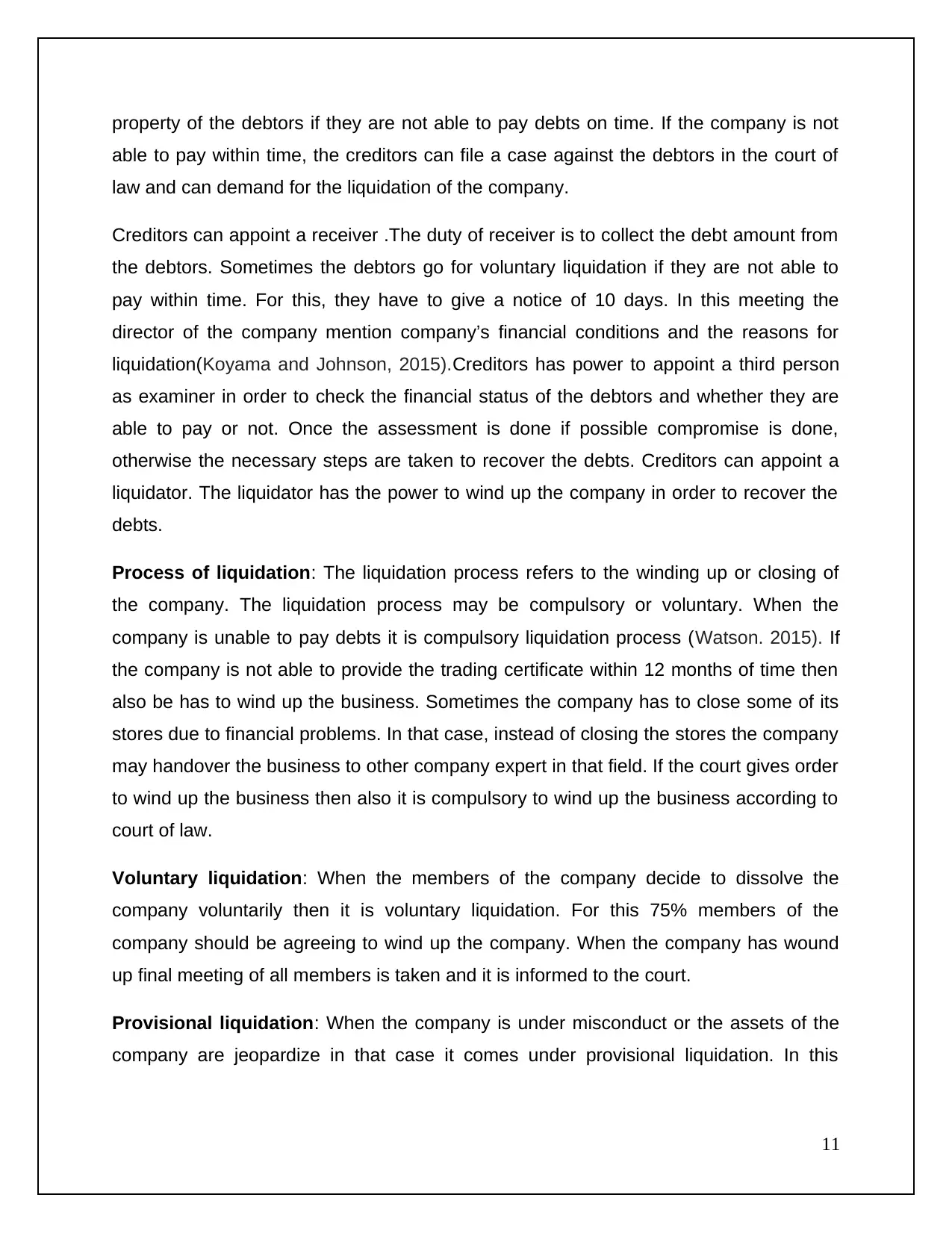
property of the debtors if they are not able to pay debts on time. If the company is not
able to pay within time, the creditors can file a case against the debtors in the court of
law and can demand for the liquidation of the company.
Creditors can appoint a receiver .The duty of receiver is to collect the debt amount from
the debtors. Sometimes the debtors go for voluntary liquidation if they are not able to
pay within time. For this, they have to give a notice of 10 days. In this meeting the
director of the company mention company’s financial conditions and the reasons for
liquidation(Koyama and Johnson, 2015).Creditors has power to appoint a third person
as examiner in order to check the financial status of the debtors and whether they are
able to pay or not. Once the assessment is done if possible compromise is done,
otherwise the necessary steps are taken to recover the debts. Creditors can appoint a
liquidator. The liquidator has the power to wind up the company in order to recover the
debts.
Process of liquidation: The liquidation process refers to the winding up or closing of
the company. The liquidation process may be compulsory or voluntary. When the
company is unable to pay debts it is compulsory liquidation process (Watson. 2015). If
the company is not able to provide the trading certificate within 12 months of time then
also be has to wind up the business. Sometimes the company has to close some of its
stores due to financial problems. In that case, instead of closing the stores the company
may handover the business to other company expert in that field. If the court gives order
to wind up the business then also it is compulsory to wind up the business according to
court of law.
Voluntary liquidation: When the members of the company decide to dissolve the
company voluntarily then it is voluntary liquidation. For this 75% members of the
company should be agreeing to wind up the company. When the company has wound
up final meeting of all members is taken and it is informed to the court.
Provisional liquidation: When the company is under misconduct or the assets of the
company are jeopardize in that case it comes under provisional liquidation. In this
11
able to pay within time, the creditors can file a case against the debtors in the court of
law and can demand for the liquidation of the company.
Creditors can appoint a receiver .The duty of receiver is to collect the debt amount from
the debtors. Sometimes the debtors go for voluntary liquidation if they are not able to
pay within time. For this, they have to give a notice of 10 days. In this meeting the
director of the company mention company’s financial conditions and the reasons for
liquidation(Koyama and Johnson, 2015).Creditors has power to appoint a third person
as examiner in order to check the financial status of the debtors and whether they are
able to pay or not. Once the assessment is done if possible compromise is done,
otherwise the necessary steps are taken to recover the debts. Creditors can appoint a
liquidator. The liquidator has the power to wind up the company in order to recover the
debts.
Process of liquidation: The liquidation process refers to the winding up or closing of
the company. The liquidation process may be compulsory or voluntary. When the
company is unable to pay debts it is compulsory liquidation process (Watson. 2015). If
the company is not able to provide the trading certificate within 12 months of time then
also be has to wind up the business. Sometimes the company has to close some of its
stores due to financial problems. In that case, instead of closing the stores the company
may handover the business to other company expert in that field. If the court gives order
to wind up the business then also it is compulsory to wind up the business according to
court of law.
Voluntary liquidation: When the members of the company decide to dissolve the
company voluntarily then it is voluntary liquidation. For this 75% members of the
company should be agreeing to wind up the company. When the company has wound
up final meeting of all members is taken and it is informed to the court.
Provisional liquidation: When the company is under misconduct or the assets of the
company are jeopardize in that case it comes under provisional liquidation. In this
11
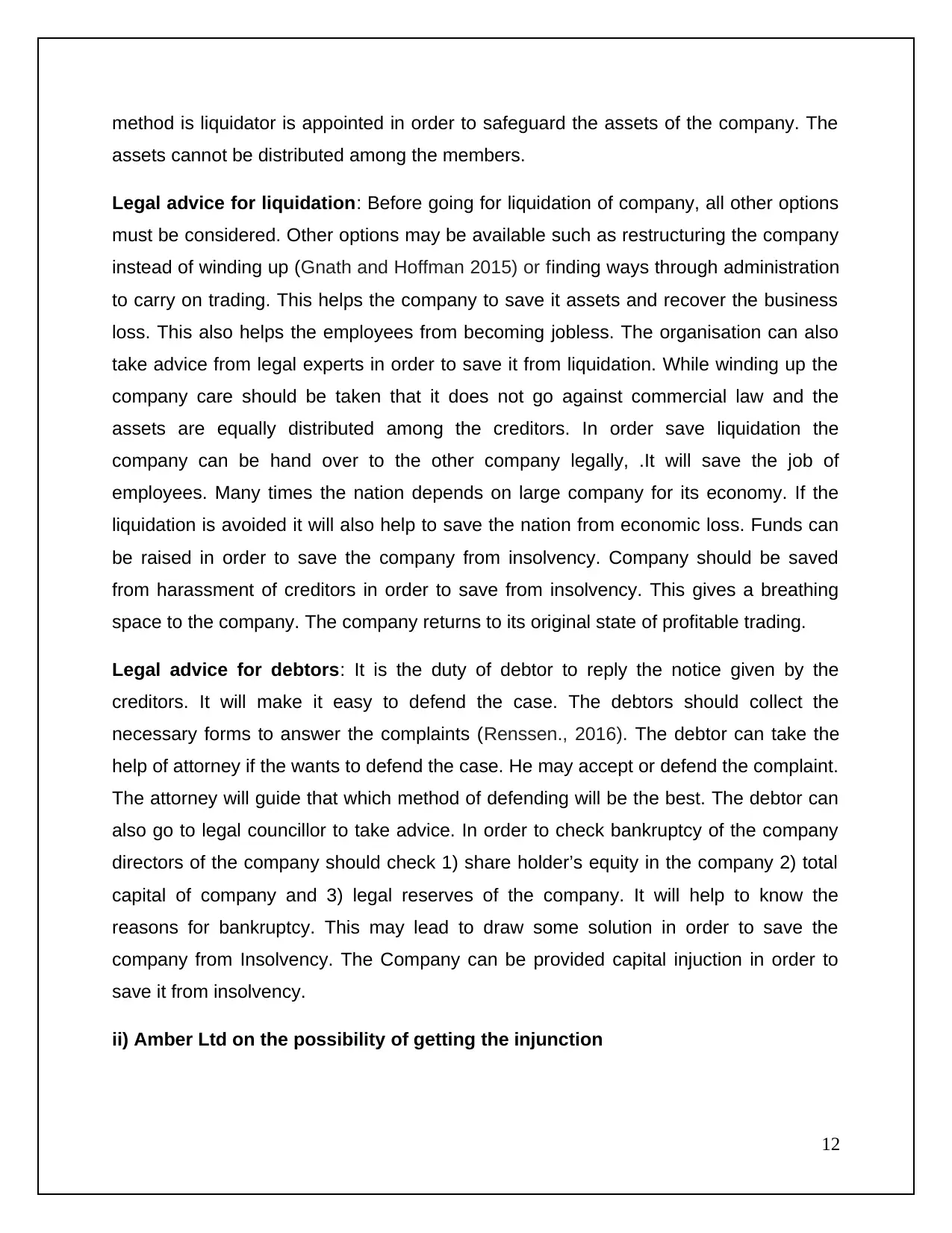
method is liquidator is appointed in order to safeguard the assets of the company. The
assets cannot be distributed among the members.
Legal advice for liquidation: Before going for liquidation of company, all other options
must be considered. Other options may be available such as restructuring the company
instead of winding up (Gnath and Hoffman 2015) or finding ways through administration
to carry on trading. This helps the company to save it assets and recover the business
loss. This also helps the employees from becoming jobless. The organisation can also
take advice from legal experts in order to save it from liquidation. While winding up the
company care should be taken that it does not go against commercial law and the
assets are equally distributed among the creditors. In order save liquidation the
company can be hand over to the other company legally, .It will save the job of
employees. Many times the nation depends on large company for its economy. If the
liquidation is avoided it will also help to save the nation from economic loss. Funds can
be raised in order to save the company from insolvency. Company should be saved
from harassment of creditors in order to save from insolvency. This gives a breathing
space to the company. The company returns to its original state of profitable trading.
Legal advice for debtors: It is the duty of debtor to reply the notice given by the
creditors. It will make it easy to defend the case. The debtors should collect the
necessary forms to answer the complaints (Renssen., 2016). The debtor can take the
help of attorney if the wants to defend the case. He may accept or defend the complaint.
The attorney will guide that which method of defending will be the best. The debtor can
also go to legal councillor to take advice. In order to check bankruptcy of the company
directors of the company should check 1) share holder’s equity in the company 2) total
capital of company and 3) legal reserves of the company. It will help to know the
reasons for bankruptcy. This may lead to draw some solution in order to save the
company from Insolvency. The Company can be provided capital injuction in order to
save it from insolvency.
ii) Amber Ltd on the possibility of getting the injunction
12
assets cannot be distributed among the members.
Legal advice for liquidation: Before going for liquidation of company, all other options
must be considered. Other options may be available such as restructuring the company
instead of winding up (Gnath and Hoffman 2015) or finding ways through administration
to carry on trading. This helps the company to save it assets and recover the business
loss. This also helps the employees from becoming jobless. The organisation can also
take advice from legal experts in order to save it from liquidation. While winding up the
company care should be taken that it does not go against commercial law and the
assets are equally distributed among the creditors. In order save liquidation the
company can be hand over to the other company legally, .It will save the job of
employees. Many times the nation depends on large company for its economy. If the
liquidation is avoided it will also help to save the nation from economic loss. Funds can
be raised in order to save the company from insolvency. Company should be saved
from harassment of creditors in order to save from insolvency. This gives a breathing
space to the company. The company returns to its original state of profitable trading.
Legal advice for debtors: It is the duty of debtor to reply the notice given by the
creditors. It will make it easy to defend the case. The debtors should collect the
necessary forms to answer the complaints (Renssen., 2016). The debtor can take the
help of attorney if the wants to defend the case. He may accept or defend the complaint.
The attorney will guide that which method of defending will be the best. The debtor can
also go to legal councillor to take advice. In order to check bankruptcy of the company
directors of the company should check 1) share holder’s equity in the company 2) total
capital of company and 3) legal reserves of the company. It will help to know the
reasons for bankruptcy. This may lead to draw some solution in order to save the
company from Insolvency. The Company can be provided capital injuction in order to
save it from insolvency.
ii) Amber Ltd on the possibility of getting the injunction
12
⊘ This is a preview!⊘
Do you want full access?
Subscribe today to unlock all pages.

Trusted by 1+ million students worldwide
1 out of 19
Related Documents
Your All-in-One AI-Powered Toolkit for Academic Success.
+13062052269
info@desklib.com
Available 24*7 on WhatsApp / Email
![[object Object]](/_next/static/media/star-bottom.7253800d.svg)
Unlock your academic potential
Copyright © 2020–2026 A2Z Services. All Rights Reserved. Developed and managed by ZUCOL.





